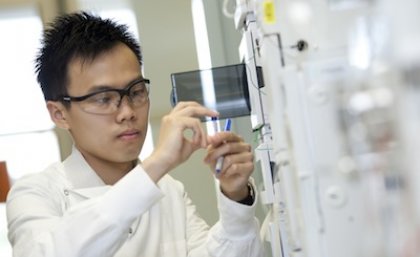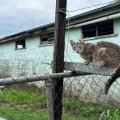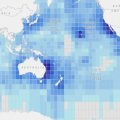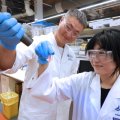
A student who used his honours year to investigate a potential drug to treat antibiotic-resistant bacteria has been named The University of Queensland’s (UQ) Valedictorian for the Bachelor of Science degree.
Ernest Tee, from Malayasia, completed his honours project at UQ’s Institute for Molecular Bioscience (IMB) and will graduate first in his class with a grade point average of 7.0 – a perfect score.
Mr Tee will be among the 332 Bachelor of Science and 162 Bachelor of Science (Honours) students graduating at the St Lucia campus today (Friday, 17 December, 2010).
His advice to other students wishing to achieve highly was to be consistent and try not to leave things to the last minute. Mr Tee also suggested identifying and pursuing other activities that complement academic studies, such as extra research work, sports and welfare work.
“At the end of the day, everyone will end up with a degree, but it’s the supplementary activities in which one has been involved in that set one’s CV apart from others,” he said.
Mr Tee spent honours under the supervision of Dr Tommy Karoli in the laboratory of Professor Matt Cooper of the IMB, an Australia Fellow whose group focuses on developing therapeutics to treat bacteria that aren’t killed by traditional antibiotics.
“Antibiotic resistance is a clear and present threat to us all, with a severe impact on the global healthcare system. The development of novel antibiotics is of paramount importance,” Mr Tee said.
“My honours research project involved synthesising a chemical compound called essramycin that supposedly demonstrated antibacterial activity.”
Essramycin was isolated from a marine bacterium from the Paltium coast at the Mediterranean Sea of Egypt. Researchers had previously suggested it was effective as a broad-spectrum antibacterial agent.
Mr Tee successfully manufactured an artificial version of essramycin and also confirmed its chemical structure. However, he found the synthetic essramycin was inactive against all major bacterial strains that were tested.
“This was in direct contrast to its reported antibacterial activity,” Mr Tee said.
“My project confirmed that essramycin is not a suitable molecule for treating antibiotic-resistant bacteria.”
Mr Tee said he chose UQ for his studies because of its excellence in both research and teaching.
“UQ attracted me because of the emphasis it places on scientific research and its world-class research centres, meaning I could be amongst the buzz at the centre of the scientific world. I was also excited due to the high standard of teaching at UQ, as judged by the many teaching awards won by UQ lecturers.
“I decided to do honours at IMB primarily because of the well-equipped laboratories and also because it is ‘student-friendly’. IMB consistently reaches out to UQ undergraduate students through the Undergraduate Research Scholarship Scheme and Summer Research Scholarships, allowing mostly inexperienced students to perform hands-on scientific work under good mentoring.”
“Within the IMB, I chose Professor Matt Cooper’s laboratory because of his research theme, which aligned with my own interests in chemical biology in infectious diseases and also the great mentoring capabilities of the senior researchers in the lab.”
Mr Tee has accepted a job as a research assistant in Professor Cooper’s laboratory in 2011 where he will continue the hunt for compounds to treat infections caused by the ‘superbugs’.
Media: Bronwyn Adams, from IMB, 07 3346 2134.
.jpg)










